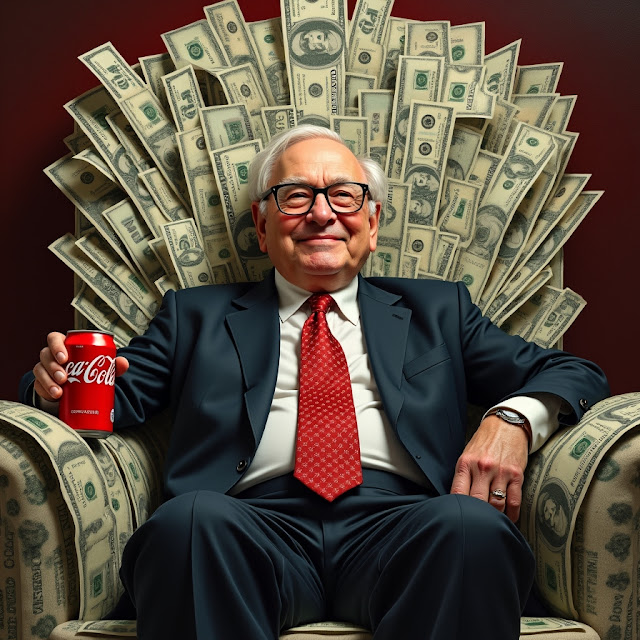FIIs and Ace investors are on Huge cash! What they have sensed?
Why Top Investors Like Warren Buffett Are Sitting on $325 Billion in Cash – A Warning Sign of an Impending Crisis?
Rumors have been circulating on Wall Street for months: some of the world’s top investors, including Warren Buffett, have supposedly amassed a cash hoard – allegedly as high as $325 billion USD. While the exact number may be disputed, the idea of top investors sitting on massive cash piles has sent fear and uncertainty rippling through markets worldwide. Is this a smart move or a sign of a crisis like 2008? In this article we’ll explore why these “experts” are shunning risk for cold hard cash and what it means for our global economy.
💸Cash is King in Uncertain Times
Cash is king – especially when the markets are uncertain. Historically, during times of economic turmoil, investors have flocked to cash as a safe haven. Remember 2008? Many seasoned investors knew that holding cash would not only protect their portfolios from further losses but also allow them to buy when the market bottomed out. Today, it seems the same sentiment is happening again.
A Hedge Against the Unknown
Warren Buffett and other ace investors are known for their measured and forward thinking. By holding a massive cash reserve they are protecting themselves against unexpected shocks that could trigger a market crash. With cash in hand they can buy undervalued assets as prices fall. In other words, they are preparing to not only weather the storm but also profit from it when the dust settles.
The $325 Billion Mystery: Why So Much Cash?
Whether it’s $325 billion or just a symbol of liquidity, the fact remains: top investors are favoring cash over riskier assets. Here are a few reasons why:
1. Global Economic Headwinds
The world’s economies are facing unprecedented challenges. Trade tensions, rising geopolitical risks and slow recovery in key sectors are casting long shadows over the markets. Many economists are warning we could be on the cusp of a big recession – one that could be as bad as 2008. For investors looking to preserve and grow their wealth, keeping a big cash buffer is a risk management strategy.* **Economic Slowdown:
Some say industrial production is slowing, consumer confidence is declining and international trade is weakening. With these warning signs in place it’s no wonder the big investors are keeping a big chunk of their portfolios in cash.
2. Rising Interest Rates and Inflation Fears
In today’s economy inflation and rising interest rates are key considerations. As central banks around the world deal with these issues the traditional growth engine – equities – can become volatile and unpredictable. Cash on the other hand provides stability. And if central banks raise interest rates further to combat inflation the cost of borrowing will skyrocket and we could see defaults and a spiraling economic downturn.
Inflation vs. Security:
Holding cash seems counterintuitive in an inflationary environment. But in times of extreme uncertainty the loss in purchasing power is a price worth paying for the flexibility and security that cash provides.
3. Market Valuation Concerns
Over the past decade global stock markets have gone parabolic with asset prices reaching unsustainable levels. Some investors think the market is due for a correction. If valuations have become irrational a correction could be both sudden and severe like 2008. By holding a big cash reserve investors are signaling they are ready to act if a big market downturn happens – they are poised to buy high quality assets at fire sale prices.
Indicators and Warning Signs: Is a 2008-Like Crisis Looming?
The idea that top investors are hoarding cash is not new. We saw the same behavior before the 2008 crisis when smart investors started to move to safer assets as the financial system began to unravel. Several technical and economic indicators point to trouble:
Technical Indicators:
High Volatility:
Recently the India VIX and US VIX have spiked suggesting nervousness is spreading among traders. These fluctuations are often a precursor to big market corrections.Diverging Market Trends:
When broader market indices start to diverge – where some sectors are strong while others are weak – it’s a sign of underlying economic imbalances. We are seeing that in many global markets lately.* Liquidity Dry-Ups:
In times of crisis liquidity can dry up quickly and markets can’t absorb the shock. Holding cash might be a strategy to avoid those pitfalls.
Economic Indicators:
Weak Corporate Earnings:
Sluggish corporate earnings in key sectors like manufacturing, banking and technology have raised red flags among investors. If companies continue to underperform we could see a broader economic downturn.Global Debt Levels:
The global debt – both government and corporate – is another big risk. A downturn could severely impair borrowers’ ability to service their debt and we could see defaults that cascade through the system.
What Does This Mean for You?
For individual investors the moves of big investors like Warren Buffett are often a signal. Never base your financial decisions solely on what they do but there are some lessons to be learned:
Stay Informed and Be Cautious:
Diversify Your Portfolio:
Make sure your investments are spread across different asset classes – stocks, bonds and cash. A diversified portfolio can protect you from extreme volatility.Keep a Cash Reserve:
While it’s tempting to chase high returns keep a big cash reserve to take advantage of market dips and reduce risk during downturns.








No comments